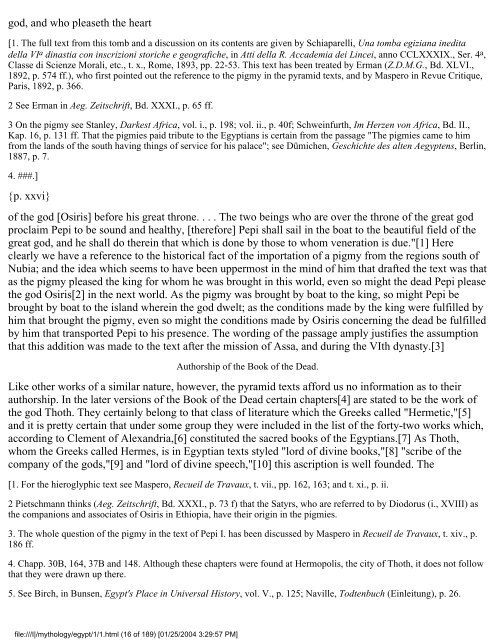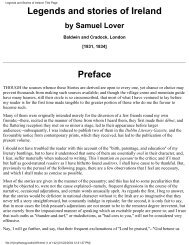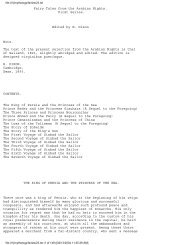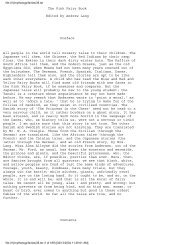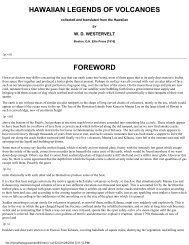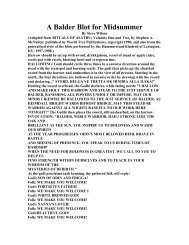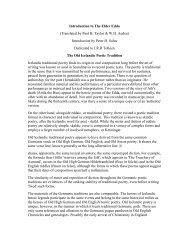You also want an ePaper? Increase the reach of your titles
YUMPU automatically turns print PDFs into web optimized ePapers that Google loves.
god, and who pleaseth the heart<br />
[1. The full text from this tomb and a discussion on its contents are given by Schiaparelli, Una tomba egiziana inedita<br />
della VI a dinastia con inscrizioni storiche e geografiche, in Atti della R. Accademia dei Lincei, anno CCLXXXIX., Ser. 4 a ,<br />
Classe di Scienze Morali, etc., t. x., Rome, 1893, pp. 22-53. This text has been treated by Erman (Z.D.M.G., Bd. XLVI.,<br />
1892, p. 574 ff.), who first pointed out the reference to the pigmy in the pyramid texts, and by Maspero in Revue Critique,<br />
Paris, 1892, p. 366.<br />
2 See Erman in Aeg. Zeitschrift, Bd. XXXI., p. 65 ff.<br />
3 On the pigmy see Stanley, Darkest Africa, vol. i., p. 198; vol. ii., p. 40f; Schweinfurth, Im Herzen von Africa, Bd. II.,<br />
Kap. 16, p. 131 ff. That the pigmies paid tribute to the Egyptians is certain from the passage "The pigmies came to him<br />
from the lands of the south having things of service for his palace"; see Dümichen, Geschichte des alten Aegyptens, Berlin,<br />
1887, p. 7.<br />
4. ###.]<br />
{p. xxvi}<br />
of the god [Osiris] before his great throne. . . . The two beings who are over the throne of the great god<br />
proclaim Pepi to be sound and healthy, [therefore] Pepi shall sail in the boat to the beautiful field of the<br />
great god, and he shall do therein that which is done by those to whom veneration is due."[1] Here<br />
clearly we have a reference to the historical fact of the importation of a pigmy from the regions south of<br />
Nubia; and the idea which seems to have been uppermost in the mind of him that drafted the text was that<br />
as the pigmy pleased the king for whom he was brought in this world, even so might the dead Pepi please<br />
the god Osiris[2] in the next world. As the pigmy was brought by boat to the king, so might Pepi be<br />
brought by boat to the island wherein the god dwelt; as the conditions made by the king were fulfilled by<br />
him that brought the pigmy, even so might the conditions made by Osiris concerning the dead be fulfilled<br />
by him that transported Pepi to his presence. The wording of the passage amply justifies the assumption<br />
that this addition was made to the text after the mission of Assa, and during the VIth dynasty.[3]<br />
Authorship of the Book of the Dead.<br />
Like other works of a similar nature, however, the pyramid texts afford us no information as to their<br />
authorship. In the later versions of the Book of the Dead certain chapters[4] are stated to be the work of<br />
the god Thoth. They certainly belong to that class of literature which the Greeks called "Hermetic,"[5]<br />
and it is pretty certain that under some group they were included in the list of the forty-two works which,<br />
according to Clement of Alexandria,[6] constituted the sacred books of the Egyptians.[7] As Thoth,<br />
whom the Greeks called Hermes, is in Egyptian texts styled "lord of divine books,"[8] "scribe of the<br />
company of the gods,"[9] and "lord of divine speech,"[10] this ascription is well founded. The<br />
[1. For the hieroglyphic text see Maspero, Recueil de Travaux, t. vii., pp. 162, 163; and t. xi., p. ii.<br />
2 Pietschmann thinks (Aeg. Zeitschrift, Bd. XXXI., p. 73 f) that the Satyrs, who are referred to by Diodorus (i., XVIII) as<br />
the companions and associates of Osiris in Ethiopia, have their origin in the pigmies.<br />
3. The whole question of the pigmy in the text of Pepi I. has been discussed by Maspero in Recueil de Travaux, t. xiv., p.<br />
186 ff.<br />
4. Chapp. 30B, 164, 37B and 148. Although these chapters were found at Hermopolis, the city of Thoth, it does not follow<br />
that they were drawn up there.<br />
5. See Birch, in Bunsen, Egypt's Place in Universal History, vol. V., p. 125; Naville, Todtenbuch (Einleitung), p. 26.<br />
file:///I|/mythology/egypt/1/1.html (16 of 189) [01/25/2004 3:29:57 PM]


